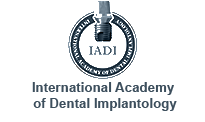






Achieving quality dentistry for life
Implant Dentistry
Dr. Lyford has been restoring dental implants since 1987. You may have spaces in your mouth where teeth were lost or removed or never grew in. Although these spaces may be embarrassing, traditional dental restorations are not always the best solution. You may not want to sacrifice the structure of surrounding healthy teeth to bridge a space or removing a complete or partial denture at night may be inconvenient. Therefore, if you want a dental restoration that looks and feels as though it is really part of your mouth, dental implants may be the right choice for you.
Used successfully for many years, dental implants anchor prosthetic (artificial) teeth into your jawbone to provide a secure, stable fit. Implants can meet your individual needs whether you are missing all, a few, or only one of your teeth. Implants are extremely effective in stabilizing and securing partial dentures and complete dentures.
Dental implants work by mimicking the structure of natural teeth, so the condition of your mouth can affect the success of your implant procedure. Like natural teeth, most dental implants are secured in the jawbone. If your mouth is healthy, you are likely to be a good candidate for dental implants.
A Healthy Mouth for the Best Results:
Your upper and lower jaws provide support and structure for your teeth and face. If you have enough healthy jawbone, you may be a good candidate for dental implants. The bone should be high and wide enough for the implant to fit. Your jaw should also have enough hard bone surrounding its soft center (marrow) to hold the implant securely. Healthy gums help to protect your jawbone from infection by healing tightly around the implant.
Implants Are Like Teeth:
Your natural teeth are stable biting and chewing surfaces because they are supported by your jawbone. This will also be true of your dental implant. Successful dental implants become firmly embedded in the jaw, providing a chewing surface almost as secure as that of natural teeth. The crowns of your natural teeth are held in place by roots. Roots not only secure your crowns but they also keep your jaws healthy by maintaining existing bone. This provides good support for your teeth. Likewise, the prosthesis is held in place by implants, which are usually made of titanium. Because this metal is well accepted by the body, titanium implants rarely cause reactions.
Using dental implants, a new prosthesis can be made to fit your individual needs. No matter how many teeth are being replaced, the basic process is the same – only the number of implants changes. If you are replacing a complete set of teeth, though, you may have the option of either a removable or fixed prosthesis
The Implant Process
During your first surgery, the surgical specialist places the implants in your jawbone. Much of the success of the entire implant process depends on how tightly your jawbone grows around the implants (osseointegration). You can help the implants “take hold” by avoiding pressure on your jaw and by keeping your gums and teeth especially clean over the next three to six months.
You can read about the Steps of the Dental Implant procedure.
You are then ready for your second surgery when your jawbone has firmly healed around the implants, usually three to six months after placement. This procedure attaches the abutments that join the implants and the prosthesis. In some cases, your surgical specialist may put temporary abutments into position, replacing them with permanent ones later.
Finally, Dr. Lyford begins making your restorative prosthesis when your gums have healed around the abutments, usually two to four weeks after surgery. Several visits may be spent analyzing the new structure of your mouth and making the prosthesis.
Implant Information
Roots Hold Crowns
The crowns of your natural teeth are held in place by roots. Roots not only secure your crowns, they also help keep your jaws healthy by maintaining healthy bone. Without the presence of tooth roots (or implants), bone levels will decrease due to disuse atrophy.
Implants Hold a Prosthesis (Crown, Bridge or Denture):
The prosthesis is held in place by implants, which are usually made of titanium. Because this metal is well accepted by the body, titanium implants rarely cause reactions. Like the roots of natural teeth, implants also maintain healthy bone. Without the presence of tooth roots (or implants), bone levels will decrease due to disuse atrophy.











